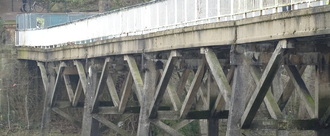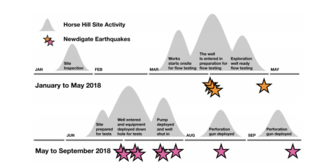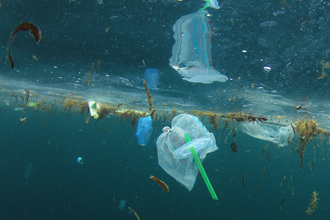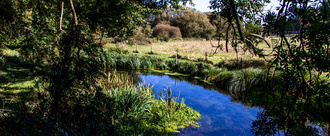-
Save Preston's Old Tramroad BridgeThe tramroad bridge is an important pedestrian and cycle route into Preston. It is well used, providing a link to the footpath network based around the old railways and the Lancaster Canal tramroad. Many people have fond memories of the bridge, which has evolved from its original purpose as part of the canal, to being the much loved strucutre that it is today. Given that walking and cycling to work are far greener than using a car or even public transport, it would be foolhardy to remove this vital link in the network of pathways to the south of Preston.6,091 of 7,000 SignaturesCreated by Michael Nye
-
Councils in Derbyshire- declare a Climate Emergency!There is global consensus that climate change poses significant risk to our health, our economy, our environment, and endangers the wellbeing of future generations. Scientific evidence clearly demonstrates that we have no more than 12 years to limit a climate catastrophe and even locally, here in Derbyshire, we are dealing with significant challenges closely linked to a changing climate. These include extreme weather events, severe impacts to Derbyshire’s rich flora and fauna, and threats to food production and supply. Communities across Derby and Derbyshire are becoming frustrated by governments that are unwilling to take the urgent steps needed, to deal with these issues. Humanity’s future depends on today’s bold and brave leaders to put traditional political differences aside and make the necessary decisions now in order to safeguard the environment, our future and those of generations to come.2,388 of 3,000 SignaturesCreated by Peter Robinson

-
Earthquakes in the UKAs of 2nd March 2019 here have been 23 earthquakes in Surrey since April 1st 2018, including a magnitude 3.1 on the 27th February. The shallow epicentres mean these earthquakes have a significant effect at the surface and therefore have a higher intensity and potential to cause structural damage. No natural explanation has been given for such an unprecedented series of increasingly strong earthquakes (unknown in the area for almost 300 years). With oil exploration and production taking place at Brockham and Horsehill and plans to significantly increase both these operations and others. Because of the risk of further significant and damaging earthquakes and the related risk to buildings, major infrastructure for example Gatwick Airport, and possibly life, as well as causing significant pollution. Clearly action must be taken to prevent any risk of a devastating earthquake being caused by hydrocarbon extraction activity.1,416 of 2,000 SignaturesCreated by Lisa Scott
-
Southampton City Council - Officially Declare a Climate EmergencyWe are asking Southampton City Council to join dozens of other local authorities across the country including cities as diverse as Bristol, Manchester and Leicester to declare a 'Climate Emergency'. By doing this, and crucially backing it up with action, it sends a message to Southampton's citizens, the country and the world, that our councillors acknowledge the scale of the threat of climate change and are going to do everything in their powers to mitigate against it. On 15 February 2019, at the YouthStrike4Climate in Central Southampton, Councillor Hammond told the children of our city, 'No ifs, no buts, we face a climate emergency'. Recently, council members told members of local environmental groups that detailing the specifics of climate change may be too scary to put into public language. We don't feel this is good enough and ask that they tell the truth. The time has come to put the importance of the environment as our home, and the need for its protection for our survival, before anything else. Not doing so, fails the population of our city. The council have set out a blueprint for a green charter for the city which commits to carbon neutrality by 2030. We applaud this commitment but the scope of carbon emissions to be reduced needs further definition as per our second point and we suggest 2025 would be better to aim for as 2030 is the ultimate deadline to prevent a global temperature rise of more than 1.5°C. The IPCC’s recent Special Report on Global Warming of 1.5°C, describes the enormous harm that a 2°C rise is likely to cause compared to a 1.5°C rise, and told us that limiting Global Warming to 1.5°C may still be possible with ambitious action from national and sub-national authorities, civil society, the private sector, indigenous peoples and local communities. If you would like to live in a greener, healthier and more sustainable city - and if you want Councillors to make decisions that support our health, protect our livelihoods, homes and children's future - then please sign this petition. If you would like peace of mind knowing that the next generation - and all generations to come - have a bright and safe future without the threat of climate change then please sign this petition. We can still avoid the climate catastrophe if those at the top, our City Council, change how they make decisions for our city. Supportive Resources: https://docs.google.com/document/d/1_QmTg-SXD8dc9PfaxEWIe-PiJgnOZLK1p6UMBh8X0AA/edit?usp=sharing1,713 of 2,000 SignaturesCreated by Extinction Rebellion
-
Ask Brighton Fringe to abandon single-use plasticsAs a resident of Brighton for over a decade, and a lover of the Fringe festival, it always strikes me as hugely problematic that incredible events such as the Fringe, which are so integral to pushing the boundaries in one area (in this case the performing arts), are not also striving to be at the forefront when it comes to environmentalism. Brighton Fringe is a wonderful event that takes place in the city each May (this year, 2019, it runs from 3rd May - 2nd June). It sees lots of corners of Brighton brought even more vividly to life than usual and provides a platform for a plethora of UK and international creatives who are at the forefront of their art forms. Many eateries in Brighton demonstrate that single use plastics can be easily avoided. This map by Plastic Free Pledge provides information of Brighton establishments making efforts to eradicate single use plastics from their services: https://www.plasticfreepledge.com/south-east I don't wish in any way to damage the reputation of the magnificent Brighton Fringe through this petition, but let's ask the organisers to ensure that it can operate in the most sustainable and thoughtful way possible.1,599 of 2,000 SignaturesCreated by Peter Myson
-
Get Aldi to commit to Zero Plastic food packagingAldi say they will continue to wrap their products in plastic for a 'better check out experience'. But Aldi shoppers want a better life experience for the planet! Aldi's shortsighted plastic policy adds to the trillions of kilos of plastic and micro plastics in our landfills and our seas. It filters down to our ground water, it gets into our fish, and we then eat it. Plastic netting from Aldi lemons and tangerines entangles and chokes seabirds. Plastic film on Aldi meat is absorbed into the chicken or salmon it comes into contact with. With a growing part of the market in the UK, urge this Supermarket of the Year to get with the Zero Plastic programme – or you'll shop elsewhere.122 of 200 SignaturesCreated by David LAMBERT
-
Protect rural Hampshire: Stop the Barton Stacey IncineratorLike tens of thousands of others, my family lives within a few miles of Barton Stacey. Our children go to local schools, and we rely on visitors to the area for our livelihoods. Of course, everyone thinks they live somewhere special. But for those of who have not yet walked in the countryside or visited our vibrant towns and cities, North West Hampshire has a wonderful charm. The area combines the rural, unspoilt character of river valley meadows with ancient woodland that provides a rich habitat for a range of animals, plants and trees. The Barton Stacey Incinerator might create 50 new full-time jobs but the impact on our countryside and the cloying effect on the infrastructure our families rely on means that it should not be granted planning permission. The background A application to build a huge plant in Barton Stacey that burns waste and converts some of it to energy has been made. The plant would need to be approved by the Secretary of State for Business, Energy and Industrial Strategy. If approved construction could could commence in 2022 and would run until 2025. The plant would be set to be one of the largest incinerators in the country, processing up to 500,000 tonnes of waste - equivalent to the weight of 75,000 elephants - per year. The facility will operate 24 hours per day, seven days per week. Only about 5% of this waste would come from local houses and businesses in the Test Valley. The rest would be driven to the plant in at least 9,600 lorries a year. If the largest lorries are used a lorry will enter or exit the site 52 times a day; if smaller lorries are used the number of arrivals and departures could be double that - at least once every ten minutes. This will be put strain on the road infrastructure across the main arterial routes such as the A303, the A34 and the M3, and will bung up local roads. As well as the impact on the road infrastructure we all rely on, the plant would have an unacceptable visual and environmental impact. Visual impact - The proposed building is 55 meters high and about 275 meters long. The stack will be about 100 metres high; about as tall as Big Ben. The main body of the plant or the chimneys will be visible from parts of Winchester, and up to 15 kilometres away. If you followed some routes it would take four hours to walk from the site to a point where the chimneys would not be visible. Environmental impact - The River Dever is only 800 metres away and the River Test is less than a mile from the plant. There are three nationally designated sites exist within two kilometres of the site: the River Test Site of Special Scientific Interest (SSSI), one of the most species rich lowland rivers in England, the Easton Aston Common SSSI and the Bransbury Common SSSI. Light pollution will increase, and measures to ensure that any pollution from the site are unclear. (Wheelabrator Technologies Inc., the would be operator, agreed to pay $7.5 million in the US to settle a 2011 lawsuit alleging that it broke environmental law by improperly disposing of contaminated sludge and waste water.) The corrosive impact of the proposed Barton Stacey Incinerator far outweigh any benefits. When we do build in rural areas, let's make sure that Slimbyism (building Something Logical in My Backyard) wins out - the Incinerator proposals are neither logical or sensible. Greg Clark should not provide the ‘Development Consent Order' that would allow the plant to go ahead.2,963 of 3,000 SignaturesCreated by Gavin Lockhart-Mirams

-
Bread in plastic bagsMost bread bought in shops these days comes in a plastic bag.Most people buy this bread as it is cheaper than unwrapped bread. Millions of bags end up in landfill . We need a campaign to change wrappers now!6 of 100 SignaturesCreated by Hazel Bowring
-
Let Bristol Breathe Clean Air – now!I cycle to work in Bristol daily and increasingly get home with a tight chest and struggling to breathe. I'm not alone. A recent report on Bristol air pollution attributed 300 premature deaths every year to NO2 and soot particles (8.5% of all Bristol deaths being due to air pollution). Polluted air contributes to onset of heart disease and cancer, causes asthma and particularly affects children and older people (Source: Bristol City Council 2018 Air Quality Annual Status Report). 2 years after the previous "Let Bristol Breathe" petition led to promises of action from the Council we now need to see it. Marvin Rees - we need clean air, not hot air! AND WE NEED IT NOW!477 of 500 SignaturesCreated by Peter Coleman-Smith
-
Make Bristol Polystyrene FreePolystyrene is toxic and non-biodegradable, so can take hundreds of years to degrade, while alternatives such as cardboard or bamboo can disappear rapidly and pose no risk to health. It is infuriating to know the potential health issues associated with this material, whilst also having to dispose of the packaging from takeaway food knowing that it will end up in a land fill, the ocean or washed up on a beach. The US has taken the lead on this and many cities have already partially or completely banned the use of polystyrene. Reasons for the proposed ban include: 1, It does not biodegrade. It may break into small pieces but the smaller polystyrene gets, the harder it is to clean up. 2, It is made of fossil fuels and synthetic chemicals. Those chemicals may leach if they come in contact with hot, greasy or acidic food. Yes, they keep your takeaway food hot, but they may add an unwanted dose of toxins to your body. Styrene is used to make polystyrene plastic and is a contaminant in all polystyrene packaging. A 1988 survey, published by the Foundation for Advancements in Science and Education found styrene in human fatty tissue with a frequency of 100% at levels from 8 to 350 nanograms per gram. This amount is one-third of the level known to cause neurotoxic symptoms in humans. Styrene attacks the central and peripheral nervous systems and the accumulation of this material in the tissues of the brain, spinal cord, and peripheral nerves is correlated with acute or chronic functional impairment of the nervous system. 3, Animals can also eat it. Turtles and fish seem to mistake polystyrene for food, and that can kill them. Not only can they not digest it, but the foam could be full of poisons that it has absorbed from contaminants floating in the water. 4, It can’t be recycled. Some commercial mailing houses may accept packing peanuts, but for the most part recycling centers do not accept throwaway polystyrene food containers. Bristol is an example of a city that does not have the capacity to recycle polystyrene currently109 of 200 SignaturesCreated by Steven Elson
-
Ban highly toxic lead fishing weightsThough the angling industry is directed by the likes of the World Health Organisation to remove lead from angling as it is a poison the industry fails to do so. Lead angling weights are known to cause humans, especially infants, a plethora of serious ill effects including: cancers, birth defects and brain diseases. Lead fishing weights are also proven to be hugely negative within the environment causing the death and harm to a multitude of life forms, from invertebrate life through to bird life. Only recently the European Chemical Agency have released a comprehensive report again highlighting the huge amount of ill effects to both humans and the environment. Unfortunately the angling trade 'protects' this product due to the huge profits made even though the facts about the harm caused by its manufacture and use are evident, and substantially proven. Just think, lead has been removed from the majority of walks of life because of its toxicity but not in angling - basically because there is no oversight and the industry is unregulated. Anglers now lose 1000's of tons into the environment each year through the insane practice of 'dumping' their leads when playing a fish resulting in further damage to the planet - one noted scientist, Vernon Thomas, stated this was now at a level where it should be classed as an environmental time bomb waiting to explode. You can no longer go in to a toy shop and buy lead soldiers due to their toxicity but you can go into any tackle shop and purchase lead angling weights. Lead has been removed from everything, from paint through to petrol but not from angling and all because of flawed profiteering. This is an out of sight issue to the general public that is very real and is harming the environment of a massive but unreported scale. In our day and age protection of the environment is paramount but this huge issue is being ignored. There are plenty of non toxic alternatives but the angling trade would not find these as profitable so they continue to sell lead regardless of the damage it is doing. Common sense needs to prevail and lead angling weights need to be fully banned - the irony is that lead angling weights under 1 oz are already banned due to their toxicity! One final thought - what impact will all this lead that is now lost into the environment have within our drinking water going forward? There is so much at risk here, this is not a case of scaremongering but the highlighting of something the fishing industry promotes purely for profit regardless of the consequences - fact!3 of 100 SignaturesCreated by Simon Pomeroy
-
STOP SIZEWELL C HUGE NEW NUCLEAR DEVELOPMENT IN SUFFOLK A.O.N.B.If SZC nuclear power station were allowed to be constructed over the forecast 12 year build period in this flood-prone rural part of East Suffolk, the unacceptable scale of environmental, social and infrastructure dislocation will be all too evident as it will:- - devastate the Suffolk Coast and Heaths Area of Outstanding Natural Beauty which provides a rich and varied mosaic of habitats that are a haven for an amazing variety of wildlife including iconic species such as bittern, marsh harrier and otter, - split the Sizewell Marshes Site of Special Scientific Interest in half with a new permanent elevated road, - be constructed on the boundary with RSPB Minsmere, with 24/7 light, noise and air pollution being a huge threat to the internationally important nature reserve as well as the wider environment, - result in the loss of acres of valuable farmland, - threaten homes, land and businesses with compulsory purchase, - see road building and alterations for 25 miles around the site, including 7 new roundabouts within an 8-mile radius of Sizewell, - add hundreds of HGV journeys to and from the Sizewell site every day, causing unacceptable levels of CO2 and NOX emissions, - harm the flourishing and sustainable tourism industry of East Suffolk affecting businesses around the much visited towns of Aldeburgh and Southwold and many popular villages as well as RSPB Minsmere and the National Trust's Dunwich Heath, - see up to 2 million litres of mains water consumed each day of nuclear power station operation, in addition to the huge volumes used during construction, in one of the driest parts of the country, - see tons of fish and other marine life sucked into the cooling pipes along with an estimated 2.5 billion gallons of sea water per day, see article re Hinkley Point C(same design as SZC): https://www.burnham-on-sea.com/news/concern-over-hinkley-point-c/ - require nuclear waste to be stored indefinitely on our crumbling, sinking coast as sea levels rise, - create a huge upfront carbon footprint during construction and from the mining, milling and fabrication of the uranium fuel together with an unknown carbon footprint at the back end of operation - see why nuclear is not the answer to climate change: https://beyondnuclearinternational.files.wordpress.com/2019/01/climate-change-chapter.pdf - lead to the production of low level radiation with all its attendant risks to human health, especially to young children and those yet to be born, see: https://beyondnuclearinternational.files.wordpress.com/2018/07/radiation-and-harm-to-human-health_27-july.pdf SIZEWELL C CANNOT BE ALLOWED AND WE CAN STOP IT IF WE ARE UNITED IN OUR OPPOSITION. PLEASE SIGN THE PETITION. For more information: www.tasizewellc.org.uk twitter: @SayNo2SizewellC3,315 of 4,000 SignaturesCreated by Together Against Sizewell C
Hello! We use cookies to improve your experience by providing insights into how the site is being used. Find out more.












